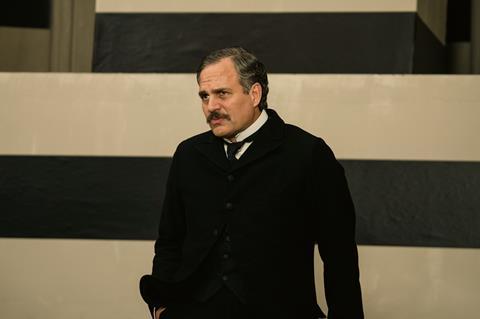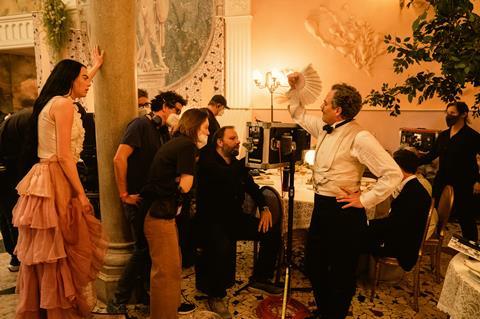
Mark Ruffalo wasn’t quite himself making Poor Things. And that, he says, was one of the reasons he wanted to sign on for director Yorgos Lanthimos’s delightfully weird comedy drama.
“At that point I was so tired of Mark Ruffalo,” says the actor best known for his soulful, nuanced performances in contemporary dramas such as Spotlight and The Kids Are All Right, and playing Bruce Banner in the Marvel films. “You fall into this kind of brand. People come to see you as one thing and I was just kind of tired of it. It felt stifling to me.”
Breaking out of the brand to play narcissistic ladies’ man Duncan Wedderburn “felt so freeing and fun”, Ruffalo enthuses.
In Searchlight Pictures’ awards-contending Victorian fairy tale, Wedderburn is the caddish lawyer who steals reanimated naif Bella Baxter (played by Emma Stone) away from her scientist father figure Dr Godwin Baxter (Willem Dafoe) and her intended husband Max (Ramy Youssef). Bella and Duncan embark on a sex-filled Continental adventure, but Wedderburn ends up being broken by his infatuation with his fiercely independent and rapidly evolving traveling companion.
Ruffalo insists that at first he wasn’t sure he was right for the role: “I’d never really done a period piece,” he points out, “and I’d never really done an accent – successfully. So it was very daunting to me.”
But Lanthimos waved away the doubts – “He just laughed at me and said, ‘You’re him’” – and the character of Wedderburn began to take shape as director and cast went through an unusual preparation process.
The point of the process, Ruffalo explains, was to find the right performance style: “It had to be forced. It wasn’t naturalistic or realistic. A big part of it was nailing that style – pushing it, but making sure it was always grounded.
“In rehearsal we just played theatre games,” Ruffalo continues. “We spent very little time on the actual script and we never talked about the characters directly. We had the script inside of us – we all knew it well at that point – so the seed was planted and it was coming out naturally in the theatre games that we were playing. It was in that playfulness that Duncan started to emerge.”
Developing Duncan’s foppish mannerisms and English accent (the film begins and ends in London even though the Alasdair Gray novel on which it is based is anchored in Glasgow) was a process in itself, one that resulted in a character whose demeanour feels of a piece with the film’s bizarre story and fantastical costumes and sets.
Ruffalo worked with in-demand British voice and dialect coach Neil Swain – also employed for Lanthimos and Stone’s previous collaboration The Favourite – on the accent, combining received pronunciation (aka RP, the standard English accent that many actors learn) with “other sounds that were more antiquated”. Terry-Thomas (portrayer of numerous screen cads of the 1950s and 60s), David Niven and Ealing comedies were also in the mix, says Ruffalo: “I even started to wonder if Duncan is actually English or if he’s just full of shit, if everything about him is a pretence.”
“I guess it sounds a little all over the place,” Ruffalo concedes of the vocal delivery, “but people have really idiosyncratic accents. The more we played with it, the more outrageous it became.”
Awards trail

Playing Wedderburn has already earned Ruffalo the National Board of Review’s supporting actor prize and a Golden Globe nomination. Those nods join a shelf of other awards for work over the past 30 years in theatre, television, indie films (as actor, writer, director and producer) and studio blockbusters. Most notable in the latter group have been Avengers and the handful of other Marvel mega-hits in which Ruffalo has brought a different kind of heft to the role of The Hulk.
There have been Oscar and Bafta supporting actor nominations for The Kids Are All Right, Foxcatcher and best picture Oscar winner Spotlight; an Emmy for his dual role in HBO limited series I Know This Much Is True; a SAG award for HBO TV movie The Normal Heart; and a Sundance special jury prize for his only film to date as a director, 2010 drama Sympathy For Delicious.
After recently appearing in Netflix miniseries All The Light We Cannot See, Ruffalo is about to start work on another HBO project, playing an FBI agent and widowed father in the premium TV outlet’s as yet untitled limited crime series from Mare Of Easttown creator Brad Ingelsby. He is also developing a series project about 1970s Los Angeles cult the Source Family.
As a producer and activist involved in climate change and Indigenous rights issues, he is working with Sarah Eagle Heart (a fellow executive producer of 2022 release Lakota Nation Vs United States) on a documentary about media depiction of Indigenous peoples, “poking fun at it but also drawing attention to how damaging it’s been”.
Ruffalo’s next feature appearance, meanwhile, is likely to be in Mickey 17, director Bong Joon Ho’s much anticipated follow-up to Parasite. The Warner Bros sci-fi drama (originally set for release this March but now being rescheduled) stars Robert Pattinson in a closely guarded story that reportedly centres on a human clone sent to colonise an alien world. Ruffalo plays what he calls “a quasi-fascist commander on the colonising spaceship. He has all the hallmarks of narcissistic authoritarians, including the charm, which is what’s so deadly about them.” The film, he adds, “has a lot of humour, but it’s just sick”.
It was another role that Ruffalo was initially unsure he could handle. “This is becoming a theme,” he jokes. “My agents sort of laugh at me now. I guess I’m a little bit insecure about my capabilities.”
In the end, though, Mickey 17, like Poor Things, gave an actor known for nice guys a welcome opportunity to go off-brand.
“Again, it was fun and freeing,” says Ruffalo. “People don’t generally see me as the bad guy and I’ve stayed away from that stuff. But I’m really enjoying embracing it now.”















![[L-R]: Amanda Villavieja, Laia Casanovas, Yasmina Praderas](https://d1nslcd7m2225b.cloudfront.net/Pictures/274x183/6/4/1/1471641_pxl_20251224_103354743_618426_crop.jpg)







![[L-R]: Amanda Villavieja, Laia Casanovas, Yasmina Praderas](https://d1nslcd7m2225b.cloudfront.net/Pictures/100x67/6/4/1/1471641_pxl_20251224_103354743_618426_crop.jpg)

No comments yet